If you are here, you might have heard about tigelle. Maybe a friend of yours is back from a trip to Italy and s/he can’t stop dreaming of tigelle with ham or pesto modenese… and you keep asking: what is tigelle bread? And… could I make it at home?
Maybe you might think it’s hard, but if you stay with me you will be surprised to learn how easy it is! I don’t usually use the “best” word in my titles, but this is actually the best tigelle recipe I have ever tried!
That’s why today I want to share it with you! 🙂
If you will like this recipe, or you will find the content useful… just PIN IT!
And if you want to support my project to spread the authentic Italian food traditions, subscribe (see page bottom). Thank you! 🙂
What are tigelle
First of all, what is tigelle bread? Tigelle is the plural of tigella, a type of bread to be filled with ham, cheese or “pesto” and Parmigiano Reggiano. Tigelle are typical of the mountains near Modena and Bologna (known in Italian as Appennino Modenese). That small portion of our mountains is an authentic cradle for typical street food, and I would highlight what I call the Modenese street food triad:
- tigelle (singular: tigella): the bread you are learning to cook today, cooked in molds named tigelliere or tigelle themselves;
- crescentine (singular: crescentina): they have different names in different parts of Emilia Romagna; crescentina in Bologna, gnocco fritto in Modena, torta fritta in Reggio Emilia. Whatever the name, crescentine are always made by rolling out the tigelle dough in a very thin way, cutting it into shapes (square or triangular) and deep-frying it in lard or (today more common) oil.
- borlenghi (singular: borlengo). While you will be able to find tigelle also in industrial preparations in the Italian supermarkets, and you will find crescentine in many restaurants, you will find borlenghi only in typical trattorie in the mountains near Modena. One of the best places for borlenghi is Zocca, which is not a lovely village in the mountains but also the hometown of the famous Italian rocker Vasco Rossi. Borlengo is a sort of flatbread, with actually the thickness of crepes, that will be filled with lard, rosemary and Parmigiano Reggiano, folded in four and … eaten. Fun fact: when you sit and order borlenghi, you don’t have to ask for a precise number of them. Just say “I will go for borlenghi” and they will start serving you with a series of borlengo dishes, one after another until you say “next one is the last one”. At the end of the meal, the host will just count the dishes on the table and get you the bill.
Tigelle or crescentine?
You know, Italians are really picky with food, and every town has its own traditional food or a different way to make/name common dishes.
But, you know what? With tigelle, we are at the next level 🙂
If you are in Bologna, I strongly suggest using the word “tigelle“. But if you are in Modena, please refer to them as “crescentine“. But… didn’t I just say that crescentine are fried dough? Let’s try to make it clear with a schema.
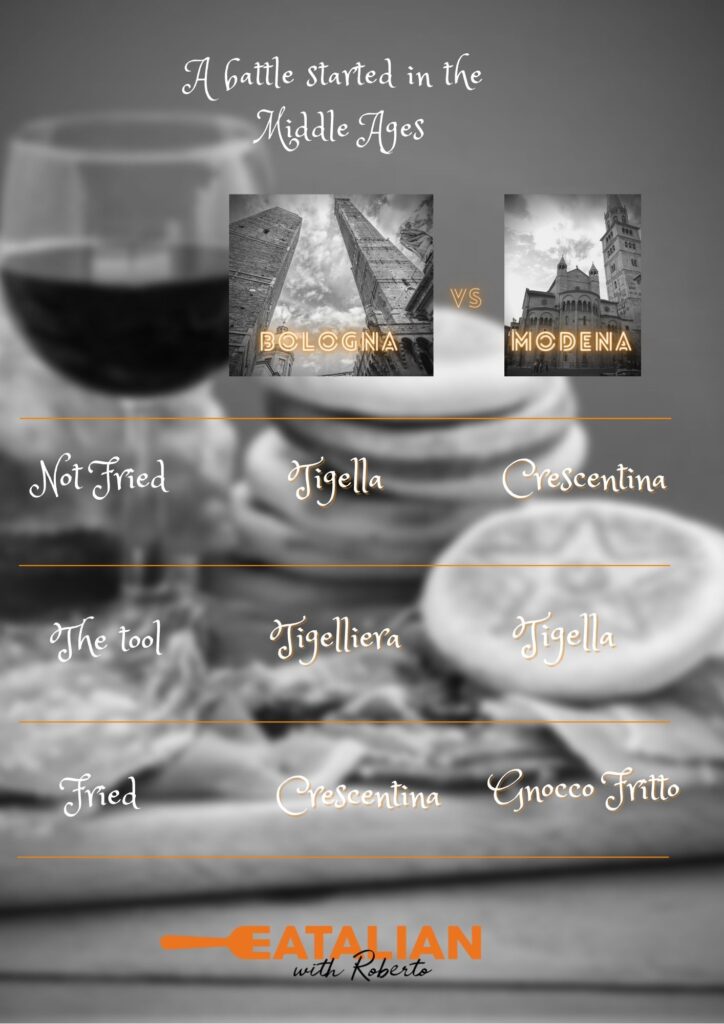
What you need to cook tigelle
You can cook tigelle using a bunch of different techniques and tools, from the most traditional to the more contemporary ones. Let’s go through them:
- traditionally, the dough was squeezed and cooked near a chimney between discs made from a high-heat resistant claystone. The discs were named tigelle, and those gave the name to the food
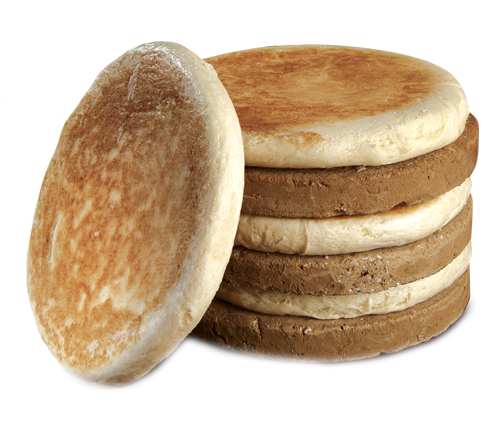
- today, many families in Modena own a tool named tigelle press (tigelliera in Italian). It can be both in cast iron (or aluminum, like this) and electric.
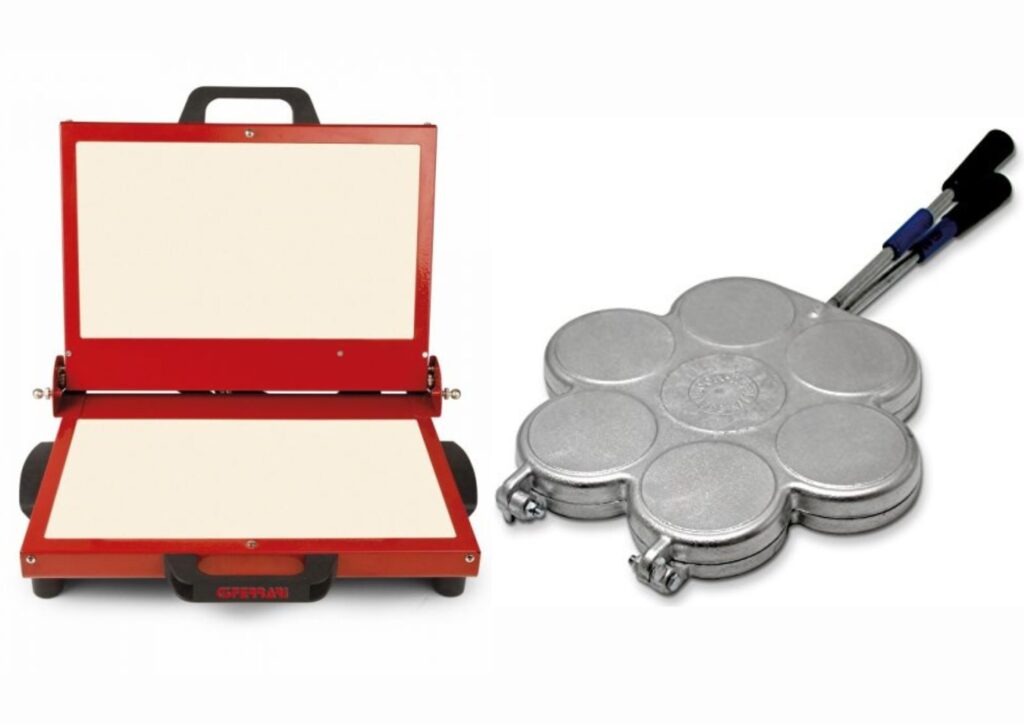
- the easiest way, with no specific tool, is to use a large pan or a crepe pan.
The best part is:
I have tried them all, starting from a very young age, and honestly, a flat pan like the one in the recipe below will work just fine and is what I always use!
Of course, if you want the traditional flower stamp on each tigella… you need a tigelle press like the one my mom uses. Or even better, this awesome t-shirt… just kidding, but since I saw it I couldn’t help sharing it with you 😀
How to eat tigelle, the real way
Well, tigelle might seem just a flatbread. And yes, if you want to fill them with prosciutto, mortadella, salame, cheese (my choice: gorgonzola) … for sure they will be great!
But there is one single way that will make them stand out: stuffed with pesto montanaro and Parmigiano Reggiano (hey, did you check my complete guide?)!
Montanaro means mountaineer and, actually, pesto montanaro is typical only of the mountains near Modena. Its ingredients are energetic and super tasty:
- lard,
- garlic, finely chopped,
- rosemary, finely chopped.
Simple like that! But if you will try once a hot tigella, cut in two and filled with pesto montanaro plus one spoon of grated Parmigiano Reggiano… you will never forget its mouthwatering taste! And you can even use them as a tasty bread if you are not into baking your own crusty loaf (well, if you are, follow my recipe of course!), or you simply don’t have enough time to.
If you enjoy Italian street food, after cooking my tigelle, you can also move from Emilia to Romagna with my piadina (from Ravenna) or to Bari with my wonderful focaccia barese or to Naples with my panuozzo with sausage and broccoli rabe!
Now that you know something more about tigelle and the love we share for this food in Emilia Romagna, let’s learn how to make the best tigelle, at home and, if you prefer, with no tigelle press! After trying, you will be amazed that this is not only an incredibly tasty one but also a very easy tigelle bread recipe!
[Update: after trying a different flour mix, I can state that using 30% of semi-integral flour will make the flavor skyrocket! I have added this in the recipe notes. Try and let me know 😉 ]
Best tigelle recipe
Equipment
- a standing mixer (I use it, but not necessary)
- a rolling pin
- a glass or a round shape
- a large pan
Ingredients
- 1000 gr flour '00' I tried mixing with a 30% of type 1 flour (semi-integral): absolutely awesome!
- 500 ml fresh milk cream
- 250 ml water q.s.
- 3 gr dried beer yeast
- q.s. salt 2-3 pinches
Instructions
- Start with the ingredients at ambient temperature.

- Start mixing flour with yeast.

- Slowly mixing, add all the milk cream.

- Always mixing, add the water. The quantity (250 ml) is perfect for my flour, but add gently so that you can use the perfect quantity for your flour.

- Add the salt, finish mixing and work the dough on the countertop. The result should be a smooth, non-sticky dough ball. Put it in a bowl (I use the standing mixer one) and cover with some plastic film. Rest for 3 hours or until it doubles.

- After the leavening, slightly press the dough with your hands and cut it in smaller parts so that using the rolling pin will be easier.

- With a rolling pin, roll the dough out, until is gets less than 1 cm thick. (Consider that it will raise considerably while cooking)

- Using a circular shaped tool or simply a glass, cut the shapes. Roll the leftovers out and cut the shapes. Repeat until the dough is finished.

- While you cut the shapes, put every tigella on baking paper, so that they don't stick. I suggest to use the oven to host them and allow them to rest for 30 to 60 minutes before cooking.

- Heat your pan at medium-high temperature, then start cooking your tigelle (6 to 9 at once, in my pan). Every 2-3 minutes flip them so they will not burn. After about 10 minutes they should be like the one in the picture, ready to be stuffed. Enjoy!

Notes
- Cook time: I have considered the cooking time for one batch of tigelle, total time depends on how many of them you will prepare and how many you can cook at once. Personally, I usually cook 9 of them at once.
- Servings: I share with you what I usually do, e.g. 1 kg of flour. This will allow to have dinner with friends or, if you are not that many people, to freeze the leftovers for future snacks! Once warmed in a toaster they will be just as perfect as freshly made.
- Calories: describe the tigelle intake, not the stuffing, pesto montanaro or gorgonzola will surely beat prosciutto 😉
- I used a standing mixer, but this recipe can be easily made with hands
- traditionally, lard is used instead of milk cream; milk cream is a worderful substitute and the result is brilliant (trust me, I have more than 40 years of experience in eating tigelle, lol).
Suggested wine pairings
Tigelle is a dish strongly rooted in the tradition of a territory, the mountains near Modena and Bologna. I strongly recommend enjoying them with wine typical of the same area, i.e. a good Lambrusco (choose the dry one, secco in Italian). If you prefer white wine, you can follow the same advice by choosing a Pignoletto, a sparkling white wine from our hills.
Disclosure
Some of the links above are affiliate links. This means that, at no additional cost to you, if you click through and make a purchase you will help this blog grow. I only promote affiliate programs that I believe in, and products I know about, with the aim to help you in your choices.
Buon appetito!

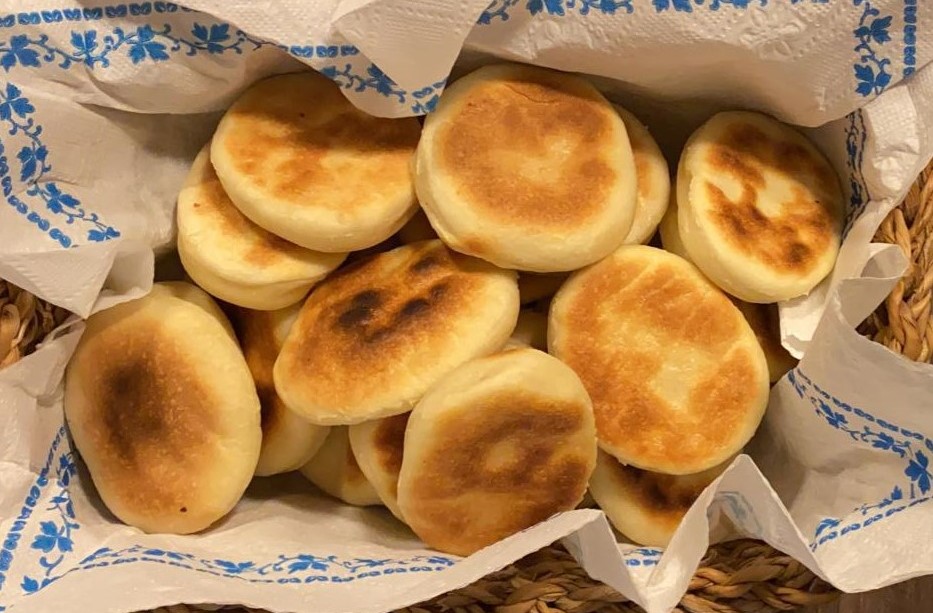

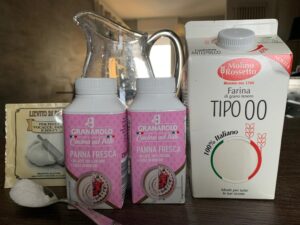
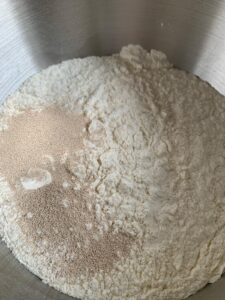
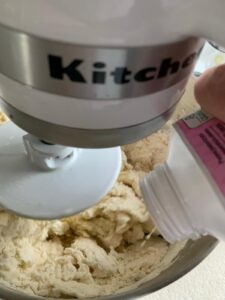
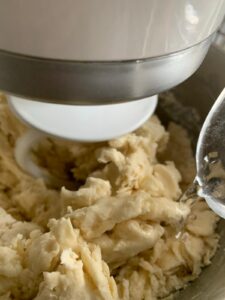
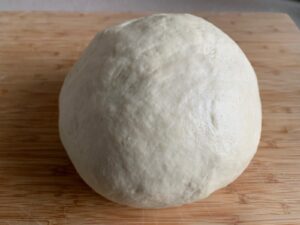
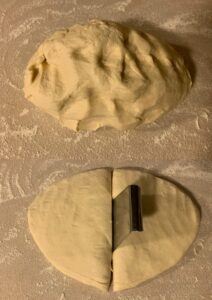
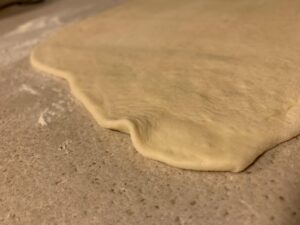
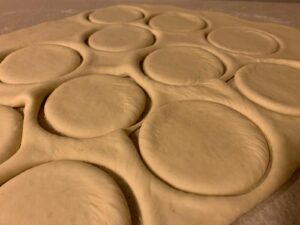
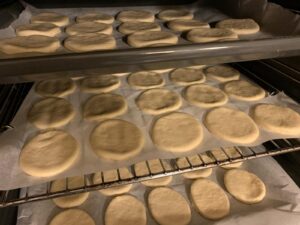
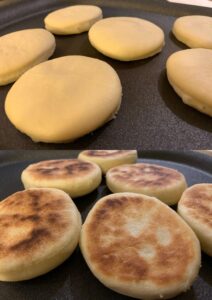

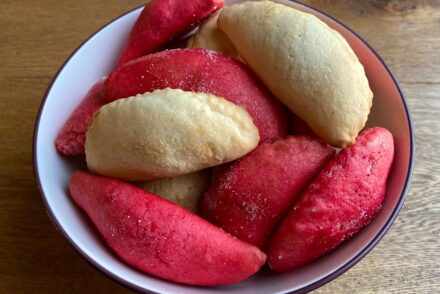
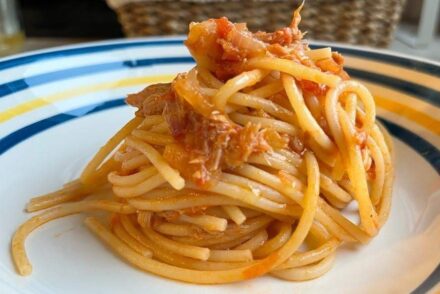
19 Comments
Hi Roberto,
How much lard would you use to replace the cram? Thanks.
Hi Matti, it would be about 300 gr of lard. If you try, I would love to know the result! 🙂
Thanks for reaching out, Roberto
Hi Roberto – I made a first batch of tigelle based on your recipe and they are wonderful! One question though: why beer yeast? I used Saf Instant Yeast and it worked just fine. Is there an advantage in using beer yeast?
Hi Dieter, first of all sorry for very late reply! Second, I use beer yeast because it’s the traditional way. Instant yeast was not available at that time 🙂 Since it’s not a long leavening recipe, I guess it will work just fine, since the yeast will work at cooking time.
Very glad you liked them, I made my last batch of tigelle last week.. my daughter is having them as a snack in the afternoon.
Enjoy, Roberto
Hi, wondering what is milk cream?
Br, Anna
hi Anna, I guess we are lost in translation here… 🙂 some people told me that they call it “heavy cream”. In Italian we have “panna” and “panna da cucina”, the second for salty preparation (like… tortellini alla panna). Here I mean the first one, which you can whip and use to create your own whipped cream to use as strawberries topping. Was it helpful? Ciao and thanks for visiting my site
Cream from milk I suppose, like heavy cream.
yes indeed! 🙂
Ciao Roberto, and thank you for this recipe that looks easy and delicious! I was in Bologna last week and literally fell in love with tigelle. I couldn’t buy the press because it was too heavy, so I’m glad I found your website. Just one question: you don’t use a little bit of olive oil for the dough? Thank you very much for your answer
Hi Letizia,
sorry for the late reply. I actually made tigelle also yesterday evening 🙂
No, definitely no olive oil, this is a recipe from the northern Appennines, so traditionally they had no oil in those places. That’s why the fat was traditionally lard or heavy milk cream. I prefer the second choice, but you can use the first one for sure. But not olive oil. Ciao!
Have you ever tried Deep frying these I had them that way at the Iowa State fair and they were awesome
deep frying these will get you what we call “gnocco fritto” or “crescentina” (in Bologna). Just wonderful 🙂
Enjoy,
Roberto
Ciao Roberto, and thank you for this recipe that looks easy and delicious! I was in Bologna last week and literally fell in love with tigelle. I couldn’t buy the press because it was too heavy, so I’m glad I found your website. Just one question: you don’t use a little bit of olive oil for the dough? Thank you very much for your answer and, one more time: grazie mille
Hi , where do you get the electrical version and how much it cost please
Hi, not sure you can see this link: https://www.amazon.it/G3-Ferrari-G10025-Tigella-Tigelliera/dp/B008YW9T8K/ref=sr_1_1?dchild=1&keywords=tigelliera+elettrica&qid=1626104329&sr=8-1
If so, this is a good model, at 126 €. Hope this helps, ciao!
Looks delicious. Will definitely try
thank you, let me know! 🙂
Finally an easy recipe for tigelle! I’ve been looking for this for
ages and the first attempt was a great success, thank you!
great! I am glad you found this recipe easy and tasty. Ciao from Italy!